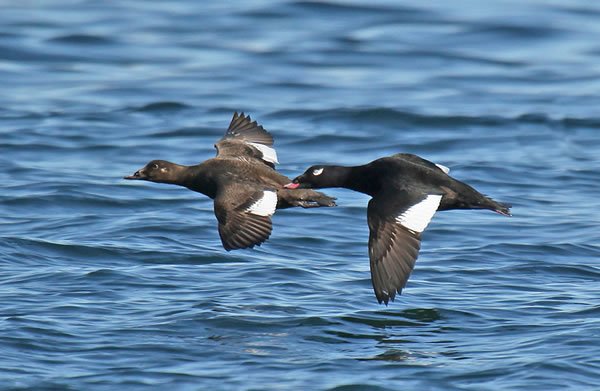SDJV28 Interim Report FY03
SDJV28 Interim Report FY04
SDJV28 Interim Report FY05
SDJV28 Final Report FY06
Related Publications
Takekawa, J. Y., S. W. De La Cruz, M. T. Wilson, E. C. Palm, J. Yee, D. R. Nysewander, J. R. Evenson, J. M. Eadie, D. Esler, W. S. Boyd, and D. H. Ward. 2011. Breeding distribution and ecology of Pacific coast Surf Scoters. Pp. 41– 64 in J. V. Wells (editor). Boreal birds of North America: a hemispheric view of their conservation links and significance. Studies in Avian Biology (no. 41), University of California Press, Berkeley, CA http://www.sfu.ca/biology/wildberg/papers/Takekawa%20et%20al%20Studies%20in%20Avian%20Biol%202011.pdf
Lok, E., D. Esler, J. Takekawa, S. De La Cruz, W. Boyd, D. Nysewander, J. Evenson, and D. Ward. 2011. Stopover Habitats of Spring Migrating Surf Scoters in Southeast Alaska. JOURNAL OF WILDLIFE MANAGEMENT 75:92–100. https://doi.org/10.1002/jwmg.5
De La Cruz, S. E. W., J. Y. Takekawa, M. T. Wilson, D. R. Nysewander, J. R. Evenson, D. Esler, W. S. Boyd, and D. H. Ward. 2009. Spring migration routes and chronology of surf scoters ( Melanitta perspicillata ): a synthesis of Pacific coast studies. Canadian Journal of Zoology 1086:1069–1086. https://doi.org/10.1139/Z09-099
Anderson, E. M., D. Esler, W. S. Boyd, J. R. Evenson, D. R. Nysewander, D. H. Ward, R. D. Dickson, B. D. Uher-Koch, C. S. VanStratt, and J. W. Hupp. 2012. Predation rates, timing, and predator composition for Scoters (Melanitta spp.) in marine habitats. Canadian Journal of Zoology 90:42–50. https://doi.org/10.1139/z11-110
Bianchini, K., S. G. Gilliland, A. M. Berlin, T. D. Bowman, W. Sean Boyd, S. E. W. De La Cruz, D. Esler, J. R. Evenson, P. L. Flint, C. Lepage, S. R. McWilliams, D. E. Meattey, J. E. Osenkowski, M. C. Perry, J.-F. Poulin, E. T. Reed, C. Roy, J.-P. L. Savard, L. Savoy, J. L. Schamber, C. S. Spiegel, J. Takekawa, D. H. Ward, and M. L. Mallory. 2023. Evaluation of breeding distribution and chronology of North American scoters. Wildlife Biology 2023:e01099. https://doi.org/10.1002/wlb3.01099
